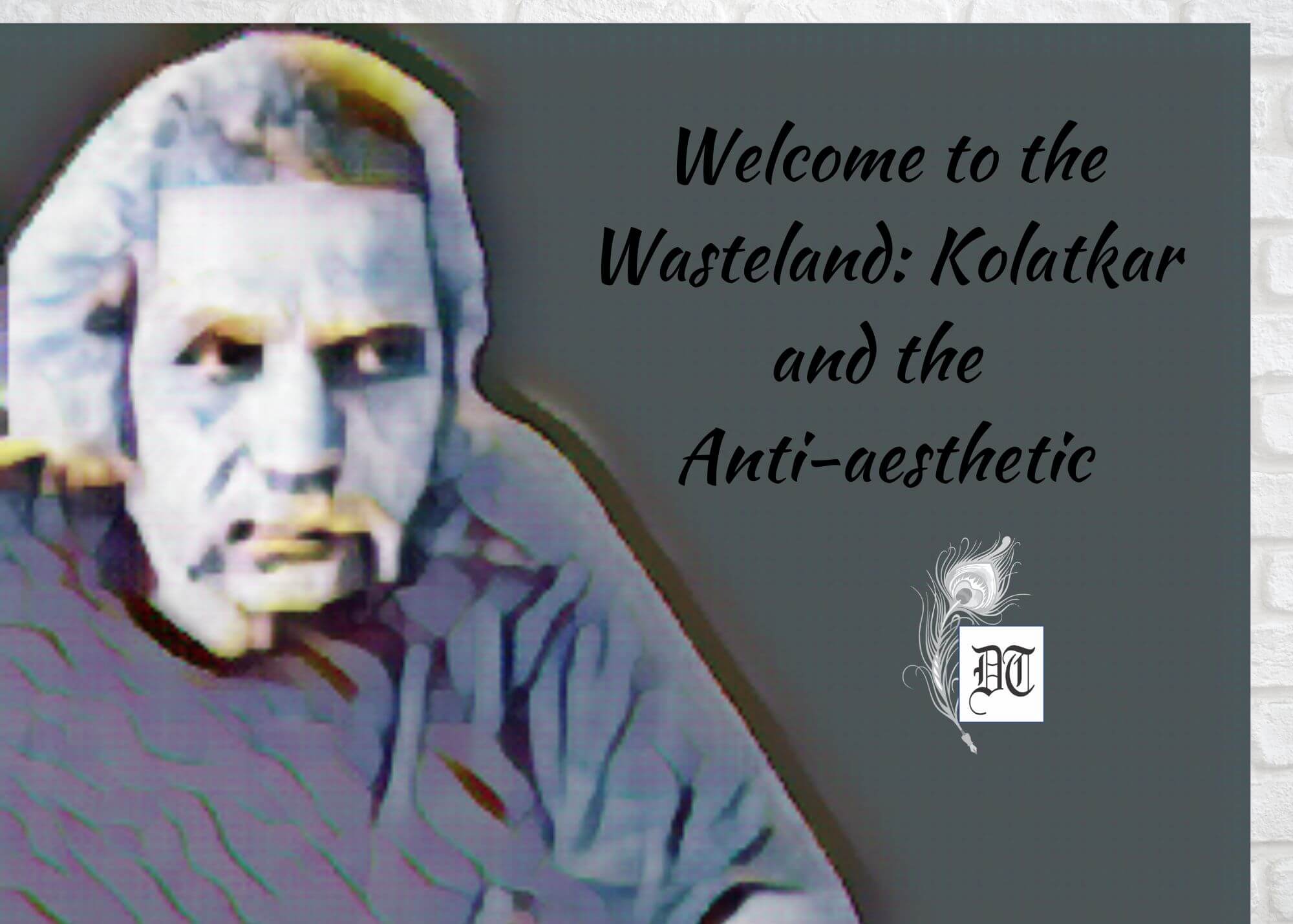Aryama explores Kolatkar’s poetry, exploring waste and marginality, challenging insignificance, and embracing newness in ordinary and discarded forms, exclusively for Different Truths.
“The flies the putrid belly buzzed about, Whence black battalions throng Of maggots, like thick liquid flowing out The living rags along And as a wave they mounted and went down. Or darted sparkling wide; As if the body, by a wild breath blown, Lived as it multiplied.” – ‘A Carcass’, Charles Baudelaire “in the form of modest piles of rubbish all along the kerb at regular intervals of about fifteen paces perhaps, and consisting of dry leaves, scraps of paper, prawn shells, onion skins, potato peels, castoff condoms, dead flowers” –‘Meera’, Arun Kolatkar “a fresh new series of installations goes on display [...]
The Marxist may argue that ‘death’ is the termination of productive value. The poststructuralist would insist that ‘death’ is, in fact, an exclusion from the realm of the symbolic, a departure from language itself—beyond which there exists no possibility of representation. Yet both shall concur that what has accumulated in the black plastic bags under the kitchen sink, forgotten if it weren’t for the stench, to be tied up with a grimace and hastily unloaded onto municipality vans the next morning, is indeed a dead waste. Waste as a motif has at large come to symbolise the absolute end of all production, an object stripped of all its essence and discarded to the amorphous pile of non-meaning, fused to a singularity that evades any distinction. This insignificance is what Kolatkar seeks to challenge, emphasising the possibility in the endless piles of urban disuse—far from sterile and valuable in its merit. It is this possibility of newness that the poet urges the reader to be aware of—to see closer and see closer still.
Kolatkar’s poetry is marked by a decentralisation, a shift from the singularity of the centre to the infinite margin…
Hailed as one of the articulators of the modern Indian consciousness, Kolatkar, with his formal richness, dexterity of the craft of poetry, and remarkably political voice, seeks to record the ordinary—objects and impressions that lie at the absolute periphery of one’s sight, the mundane margins. Kolatkar’s poetry is marked by a decentralisation, a shift from the singularity of the center to the infinite margin, formless and pulsating, scandalising the senses of the reader with its abundance. Kolatkar, in his poetry, firmly rejects totalitarian doctrine, choosing instead to blur the binaries that totalitarianism seeks to establish. The aesthetic, widely celebrated in artistic traditions as the adjudicator between art and non-art, is interrogated as a majoritarian dogma, a tyrannical structure that reduces experience to nothingness by its formal deafness. The marginal therefore must be expressed in a form remarkably distinct from the aesthetic, an anti-aesthetic.
With this objective, the poetic self embarks on a ceaseless inclusion of all that is excluded, accommodating the endless possibility of sensual ecstasy: “whole families of pavement dwellers, bums and lepers, grannies and crippled, children, dogs and cats, rubbish, old tyres and birds, things and objects abandoned on the sideways, on the margins both of modernization and of our ordinary perception or exclusive vision.” (Zecchini,1) Such possibilities are characterised by fleetingness, or “difference”, a constant state of flux that resists singularity, instead indicating a spectrum or continuum of meaning. The known or the ordinary is defamiliarized and undercut by strangeness, which is mediated through history, culture, and language and revealed only to those who see. Seeing, for Kolatkar, is not simply a sensory exercise but a deeply political one—a deliberate resistance to the forces of totalitarianism that constantly seek to diminish the ‘other’. Ever-encroaching blindness awaits just around the corner. the crabs, pincers raised, say, “They’re going to eat your eyes.” Kolatkar says. He insists that one must stand witness to being martyred in the struggle against forgetting.
Kolatkar’s commitment to inclusion takes him to the wasteland. The garbage dump emerges as an orchard or rather a parody of an orchard—the very comparison of a scandal to ordinary sensibilities. The comparison, however, attributes the rubbish with a certain sensual richness, some great nourishment contained within, and a greater purpose or meaning.
“We too have our tryst with destiny, and feel the birth pangs of a new city,” – ‘Song of Rubbish’, Kolatkar
Despite its contribution to the project of nation-building, rubbish is fated to endure exclusion, discarded into a formless oneness, the dump, invisibilized from common view. However, on closer inspection, by opening one’s senses to the marginalised experience, one may recognise the plural richness in the rubbish. Just beyond the margins of our senses, great forces are at work, conniving secretly for a silent purpose.
“But watch out when rubbish meets rubbish in the back of a truck, and more rubbish in a whole caravan of trucks, and then some more in a vast landfill site” – ‘A Note on the Reproductive Cycle of Rubbish’, Kolatkar
Even piles of industrial waste refuse to be subjected to stagnancy but are in a state of movement…
Even piles of industrial waste refuse to be subjected to stagnancy but are in a state of movement, changing form and meaning as they “mature” and return to the cycle of production. Kolatkar uses the imagery of lovemaking, a parody of courtship and grotesque intercourse, which symbolises fertility, productivity, or a certain value that can be extracted from what is otherwise abandoned.
“Rubbish waits. Patiently. And copulates with the winner.” – ibid.
The motif of waste in Kolatkar’s poetry can also be read in the light of Agamben’s conceptualisation of the “bare life”, a population of expendables pushed to the margins by systematic exclusion from “civil society” but under the larger frameworks of legality – human waste’. These bare lives, those on the Kala Ghoda crossing, find a place in the poetic imagination, the fantastic lying-in-plain eyesight, and a certain sense of conspiratorial secrecy in their otherwise bareness.
“The three-sided silence of the potato peelers makes a prism that seizes on a fleeting thought that crosses the mind of a bakery boy and sends a freakish sliver of an illicit rainbow streaking across to touch the mind of a half-witted woman who looks a lot like laughing Buddha” – ‘The Potato Peelers’, Kolatkar
Kolatkar’s commitment to the endless inclusion of the ‘other’ is reflected in the motif of waste that permeates his poetry. He seeks to imbibe even the bare and the banal into the ambit of his poetic consciousness which is truly cosmopolitan. Every aspect of the cosmopolitan space is observed and interrogated, the poet resorts to rest in a teeming multiplicity of meaning rather than singular dogma.
Works Cited
- Baudelaire, Charles. Fluers du Mal. Trans. Richard Herne Shepherd, John Camden Hotten, 1869.
- Kolatkar, Arun. Kala Ghora Poems. Pras Prakashan. 2006.
- Zecchini, Laetitia. Strangeness and Historicity Against Nativism: Blurring the frontiers of the nation in Arun Kolatkar’s poetry. Orientalia Suecana LX. 2011.
Picture design by Anumita Roy





 By
By
 By
By
 By
By
 By
By